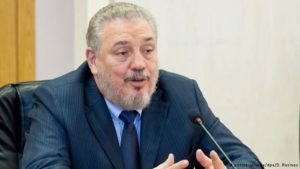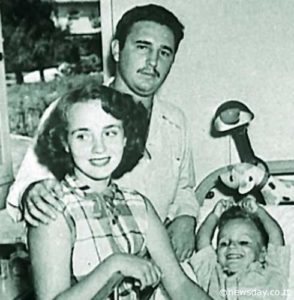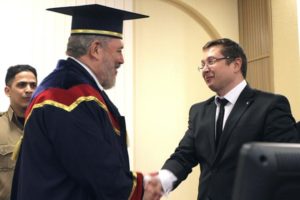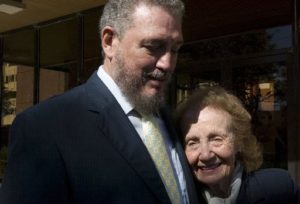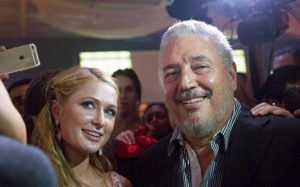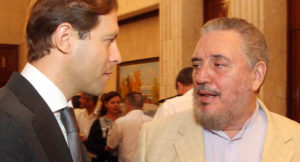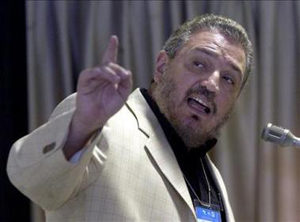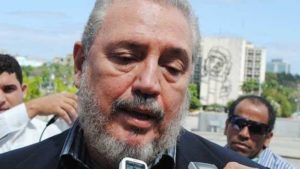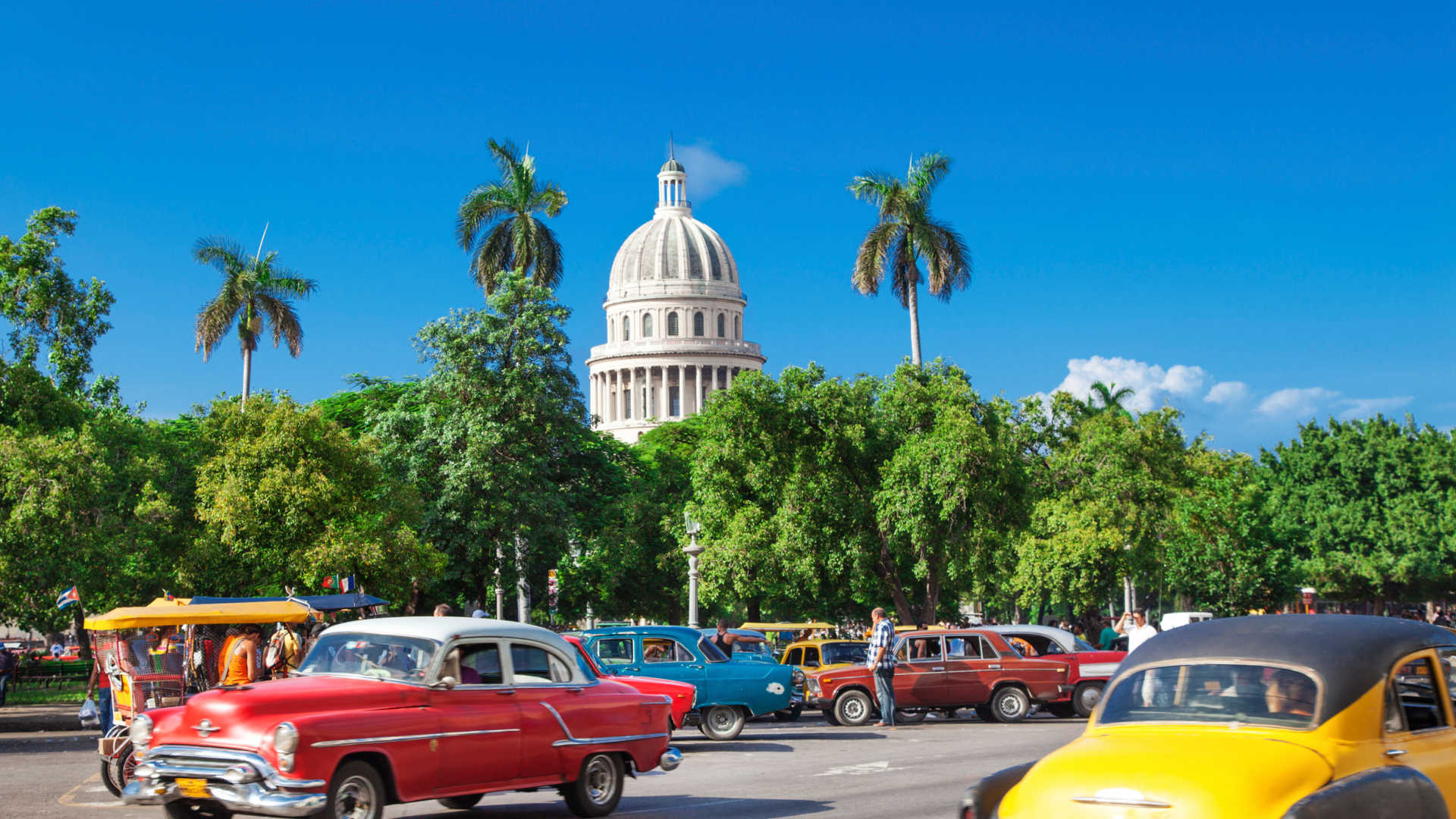Fidel Castro Diaz-Balart is the first-born of the late Cuban ex-president Fidel Castro Ruz.
The mystery that surrounds him, of whose private life, childhood, adolescence and youth thanks to the halo of secrecy that his father created around everything and in particular of his family, very little is known about him who once thought he could become a successor of the Castro throne.
Fidelito as he is also known is the son of Mirta Francisca de la Caridad Díaz-Balart y Gutiérrez (born September 30, 1928) and Fidel Castro Ruz, she his first wife, both married on October 11, 1948 and divorced seven years later. (while Castro was in exile) in 1955. Fidelito was born on September 1, 1949. After the divorce, Castro was not given custody of the child. Instead he kidnapped the boy when he went to see him in Mexico before leaving on the expedition to Cuba.
The reality is that Fidel Castro did not concern himself with anything related to his son, after removing his mother from the line of the Díaz-Balart family, in some way responsible for his being still alive, and rarely saw him or her. He talked with him, and those contacts became even more sporadic as other children appeared, with his new wife, Dalia Soto del Valle, who jealously guarded the priority for her five children, those who had no contact with Fidelito or others descendants conceived by the maximum leader out of wedlock.
José Raúl (name he used during his stay in the Soviet Union) or Fidelito -as they prefer to call him- returned to Cuba with the triumph of the revolution led by his father in 1959. There are several versions of this return, one of them, the one I’ve heard more, is that Fidel Castro took him to the island and never returned him to the side of his mother, Mirtha Díaz-Balart. If there were claims or not by Mirtha I do not know, but the truth is that Fidelito stayed in Cuba. But staying in Cuba does not mean specifically that in these years he was next to his father, nor that he received the warmth and paternal affection.
Fidelito married his first wife in Russia, which is called Natalia Smirnova, although they have been divorcing for years, Natalia has stayed to live in Cuba, both have 3 children, Mirtha María Castro Smirnov, Fidel Antonio Castro Smirnov and José Raúl Castro Smirnov. The current wife of Fidelito is María Victoria Barreiro Dávalo, who works as the director of EURICOM S.P.A.
Fidel Angel Castro Díaz-Balart graduated from Lomonosov University in Moscow and was linked to the Kurchatov Institute, a prestigious Russian atomic energy institution. Castro’s eldest son also holds a master’s degree in Physics, a PhD in Physics-Mathematics and a PhD in Science. In the 1980s, he was closely linked to the study and development of nuclear energy for use in Cuba, and founded the Higher Institute of Nuclear Sciences and Technology in Havana. During those years he was in charge of the construction of the Juraguá nuclear plant, which was not finished by the fall of the socialist camp and today is nothing more than a ruinous memory of the cooperation between Cuba and the Soviet Union.
The Cuban government then assigned one of the officials from his embassy in Moscow to attend to him and personally deal with Fidelito’s needs, while KGB officials supervised his security. The first-born resided in an apartment in the Moscow capital and had all the comfort conditions for his enjoyment.
When he finished his university studies, he returned to Havana and later the Nuclear Energy Institute was created, “la Nuclear”, as that institution located on 5th Avenue, in the neighborhood of Miramar, was known. To support Fidelito, a direct order was created by José Abrantes, then Vice Minister of the Cuban Interior (MININT), a special department for the security of both Fidelito and the newly created institute. Some of its troops were taken from the former Special Troops Unit of the MININT; In this way, a team of escorts and cars also appeared that accompanied him to all places.
Fidel Castro Díaz-Balart lived in the housing complex on Calle 26 in the neighborhood of Nuevo Vedado, residence of the Castro-Espín family, his uncles and cousins. For many years a Personal Security Officer with the surname Fulleda was in charge of attending all the needs of the adolescent, even during his student period when he returned to Cuba during vacation periods. José Raúl grew up without the warmth of a mother, who settled in Madrid since 1959, and without the attention that Castro had to give him as a father. In that way, Fulleda, the officer in charge, filled in a certain way that emotional void.
Even being affectionately away from his father, Fidelito tried to imitate him as much as possible. He let his beard grow, he had Alfa Romeo cars as the dictator had had them and he got to the point of having suits, clothes and snacks in the trunks of the vehicles, in the best style of Fidel Castro.
These deferments offered to the young Castro raised a wave of adverse comments within the gubrenamental dome, since Fidelito had neither the rank nor the position to have such ostentation of power. But what really caused a debacle in his career was the fact that the financial status of ¨La Nuclear¨ was increasingly disastrous, and his personal expenses in travel and vacations were extraordinary, to the point that they came to compete with administrative expenses of the institution that he directed.
Fidelito had copied so much and so well from his father that, without being a high government official, he misused and squandered both his resources and his father. Those prebends of power are reserved only in Cuba for Fidel Castro himself and his brother Raúl. The others, whoever they are, have to be and show themselves far below this standard of living. And so it was that Fidelito’s defeat was at the forefront of the development of nuclear energy on the island.
Although he has not been completely eliminated, since he still has the positions of chief leader of the Nuclear Commission in the Cuban Parliament and advisor to the State Council for nuclear affairs, he has never again had in his hands as many resources as he had with his feet in the 80s and early 90s. Another person in his place would have gone to prison as a scapegoat to hide corruption at the highest levels of power, but his status as Fidel Castro’s son saved him from the bad time.
Fidel Castro Diaz-Balart, according to the official press published, has published several works in which he illustrates the problems of science and technology based on the development of knowledge, as well as its social aspect and the corresponding influence on politics, economy and culture. , has made several work visits in different countries, offering press conferences and exchanging with scientific and educational authorities.
According to the Cuban official press, Dr. Fidel Castro Diaz-Balart “has been able to present with certainty and clarity the possibilities of collaboration between Cuba and other nations and is a staunch defender of the elimination of weapons of mass destruction and the use of nuclear energy for peaceful purposes “.
Fidel Ángel Castro Díaz-Balart, committed suicide this February 1 in the morning, informed the official press of the island, which mentioned “a deep depressed state”. He was 68 years old.
According to the report, Castro Díaz-Balart “had been treated by a group of doctors for several months.”
As part of the treatment “initially required a hospitalization regime and then remained ambulatory monitoring during their social reincorporation.”
The official Cuban media do not usually report details such as the way in which death occurred, especially if it is a suicide, an act that the regime has always considered dishonorable.
FIDEL CASTRO DÍAZ-BALART. “FIDELITO”. HISTORIA DEL PRIMOGÉNITO DE FIDEL CASTRO RUZ.
Fidel Castro Diaz-Balart es el primogénito del difunto ex-presidente de Cuba Fidel Castro Ruz.
El misterio que lo envuelve, de cuya vida privada, niñez, adolescencia y juventud gracias al halo de secretismo que su padre creó alrededor de todo y en particular de su familia, muy poco se conoce de el quien alguna vez se pensó podría convertirse en sucesor del trono castrista.
Fidelito como tambien se le conoce es hijo de Mirta Francisca de la Caridad Díaz-Balart y Gutiérrez (nacida el 30 de September 1928) y quien fue su primera esposa, ambos se casaron el 11 de Octubre 11 de 1948 y se divorciaron siete años despues (mientras Castro estaba en el exilio) en 1955. Fidelito nació el 1 de September de 1949. Despues del divorcio, a Castro no se le dió la custodia del niño. En su lugar se quedó con el secuestrado cuando este lo fue a ver a México antes de partir en la expedición a Cuba.
La realidad es que Fidel Castro no se ocupó para nada de lo relacionado con su hijo, después de quitar del camino a su madre, de la estirpe de los Díaz-Balart, de alguna forma responsables de que siguiera vivo, y raramente lo veía o conversaba con él, y esos contactos se hicieron aún más esporádicos en la medida en que fueron apareciendo otros hijos esposa, Dalia Soto del Valle, la que cuidó celosamente la prioridad para sus cinco hijos, los que no tenían contacto con Fidelito ni con otros de los descendientes concebidos por el líder máximo fuera de matrimonio.
José Raúl (nombre que usó durante su estancia en la Unión Soviética) o Fidelito -como prefieran llamarle- regresó a Cuba con el triunfo de la revolución liderada por su padre en 1959. Hay varias versiones sobre este regreso, una de ellas, la que más he oido, es que Fidel Castro lo llevó a la isla y nunca más lo regresó al lado de su madre, Mirtha Díaz-Balart. Si hubo o no reclamaciones por parte de Mirtha no lo sé, pero lo cierto es que Fidelito se quedó en Cuba. Pero quedarse en Cuba no significa específicamente que en estos años estuvo al lado de su padre, ni que recibió el calor y cariño paternal.
Fidelito se casó con su primera esposa en Rusia, la cual se llama Natalia Smirnova, aunque ya hace años que se divorciaron, Natalia se ha quedado a vivir en Cuba, ambos tienen 3 hijos, Mirtha María Castro Smirnova, Fidel Antonio Castro Smirnova y José Raúl Castro Smirnova.
La actual esposa de Fidelito es María Victoria Barreiro Dávalo, la cual trabaja como la directora de EURICOM S.P.A.
Fidel Angel Castro Díaz-Balart se graduó en la Universidad de Lomonosov en Moscú y estuvo vinculado al Instituto Kurchatov, una prestigiosa institución de energia atómica de Rusia. El primogénito de Castro también es máster en Física, doctor en Ciencias Físico-matemáticas y doctor en Ciencias. En la década de los 80 estuvo estrechamente vinculado al estudio y desarrollo de la energía nuclear para su empleo en Cuba, y fundó el Instituto Superior de Ciencias y Tecnología Nucleares de La Habana. Por esos años estuvo a cargo de la construcción de la planta nuclear de Juraguá, que no se terminó por la caída del campo socialista y hoy no es más que un ruinoso recuerdo de la cooperación entre Cuba y la Unión Soviética.
El gobierno cubano asignó entonces uno de los funcionarios de su embajada en Moscú para que lo atendiera y se ocupara personalmente de las necesidades de Fidelito, mientras que oficiales de la KGB supervisaban su seguridad. El primogénito residía en un apartamento en la capital moscovita y tenía todas las condiciones de confort para su disfrute.
Cuando terminó sus estudios universitarios, regresó a La Habana y tiempo después se creó el Instituto de Energía Nuclear, “la Nuclear”, como era conocida esa institución situada en la 5ta Avenida, en el barrio de Miramar. Para apoyar a Fidelito se creó por orden directa de José Abrantes, por entonces Viceministro del Interior cubano (MININT), un departamento especial para la seguridad, tanto de Fidelito como del recién creado instituto. Algunos de sus efectivos fueron sacados de la antigua Unidad de Tropas Especiales del MININT; de esta forma también surgió un equipo de escoltas y autos que lo acompañaban a todos los lugares.
Fidel Castro Díaz-Balart vivía en el complejo habitacional de la Calle 26 en el barrio de Nuevo Vedado, lugar de residencia de la familia Castro-Espín, sus tíos y primos. Durante muchos años un oficial de la Seguridad Personal de apellido Fulleda era el encargado de atender todas las necesidades del adolescente, incluso en su etapa de estudiante que regresaba a Cuba en periodos vacacionales. José Raúl se crió sin el calor de una madre, que se radicó en Madrid desde 1959, y sin la atención que Castro debió darle como padre. De esa manera, Fulleda, el oficial a cargo, llenaba en cierto modo ese vacío afectivo.
Aún estando alejado afectivamente de su padre, Fidelito trataba de imitarlo en todo lo posible. Se dejó crecer la barba, tenía autos marca Alfa Romeo como los había tenido el dictador y llegó al punto de tener trajes, vestimenta y refrigerios en los baúles de los vehículos, en el mejor estilo de Fidel Castro.
Estas deferencias ofrecidas al joven Castro levantaron una ola de comentarios adversos dentro de la cúpula gubrenamental, ya que Fidelito no tenía ni el rango ni el cargo para contar con tanta ostentación de poder. Pero lo que realmente causó una debacle en su carrera fue el hecho de que el estado financiero de ¨la Nuclear¨era cada vez más desastroso, y sus gastos personales en viajes y vacaciones resultaban extraordinarios, al punto que llegaron a competir con los gastos administrativos de la institución que dirigía.
Fidelito había copiado tanto y tan bien a su padre que, sin ser un alto funcionario del gobierno, malversaba y despilfarraba tanto recursos como su progenitor. Esas prebendas de poder sólo están reservadas en Cuba para el propio Fidel Castro y su hermano Raúl. Los demás, sean quien sean, tienen que estar y mostrarse muy por debajo de este estándar de vida. Y así fue que sobrevino el descalabro de Fidelito al frente del desarrollo de la energía nuclear en la isla.
Aunque no ha sido eliminado del todo, pues aún le quedan los cargos de principal dirigente de la Comisión Nuclear en el Parlamento cubano y asesor del Consejo de Estado para asuntos nucleares, nunca más ha tenido en sus manos tantos recursos como los que tuvo a sus pies en los años 80 y comienzos de los 90. Otra persona en su lugar hubiera ido a prisión como chivo expiatorio para esconder la corrupción en los máximos niveles del poder, pero su condición de hijo de Fidel Castro lo salvó del mal rato.
Fidel Castro Diaz-Balart, según la prensa oficial, “ha publicado varios trabajos donde ilustra la problemática de la ciencia y la tecnología a partir de desarrollo del conocimiento, así como su aspecto social y la correspondiente influencia en la política, la economía y la cultura, ha realizado varias visitas de trabajo en diferentes países, ofreciendo conferencias de prensa e intercambiando con autoridades científicas y educacionales”.
Según la prensa oficialista cubana el Dr. Fidel Castro Diaz-Balart “ha sabido exponer con certeza y claridad las posibilidades de colaboración entre Cuba y otras naciones y es un defensor a ultranza de la eliminación de las armas de destrucción masiva y el uso de la energía nuclear con fines pacíficos”.
Fidel Ángel Castro Díaz-Balart, se suicidó este 1 de febrero por la mañana, informó la prensa oficial de la Isla, que mencionó “un estado depresivo profundo”. Tenía 68 años.
Según el reporte, Castro Díaz-Balart “venía siendo atendido por un grupo de médicos desde hace varios meses”.
Como parte del tratamiento “requirió inicialmente un régimen de hospitalización y luego se mantuvo con seguimiento ambulatorio durante su reincorporación social”.
Los medios oficiales cubanos no suelen informar detalles como la forma en que se produjo la muerte, sobre todo si se trata de un suicidio, acto que el régimen ha considerado siempre deshonroso.
Agencies/Wiki/Various/Internet Photos/Excerpts/Arnoldo Varona/TheCubanHistory.com
THE CUBAN HISTORY, HOLLYWOOD.



